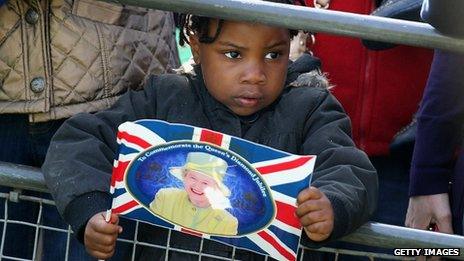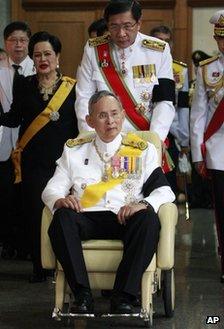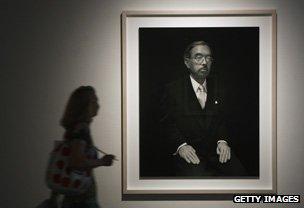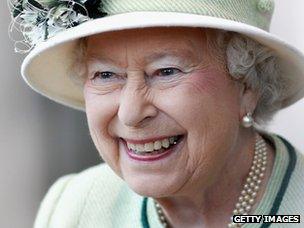A Point of View: Making sense of six decades on the throne
- Published

Few monarchs make it to their diamond jubilee - and in the past century or so, many of the world's royal dynasties have fallen by the wayside. So the festivities can carry a hint of relief and thankfulness, says historian David Cannadine.
It may not yet have fully impinged upon the collective public consciousness, but we are well into the season of celebrating the Diamond Jubilee.
The Queen has received addresses from both houses of parliament at a ceremony in Westminster Hall; she's already driven through the streets of London to widespread popular acclaim; and other members of the royal family have begun their visits, on her behalf, to the countries of the Commonwealth.
The climax of these celebrations will be the thanksgiving service, to be held at St Paul's Cathedral on 5 June, in conscious replication of that held for Queen Victoria when she celebrated her Diamond Jubilee in the summer of 1897.
It's undeniably true that in some ways such royal jubilees are a relatively recent invention, but their historic origins do go back to the very distant past.
In ancient Egypt, pharaohs who reigned for 30 years celebrated jubilees, in the hope that the accompanying festivities would help regenerate their strength and restore their stamina. And according to the Old Testament, there should be jubilees after seven cycles of seven sabbatical years, as explained in the Book of Leviticus: "Consecrate the fiftieth year, and proclaim liberty throughout the land unto all the inhabitants thereof."
Despite these early precedents, it's certainly true that diamond jubilees, marking 60 years on the throne, are very much an invention of the late 19th and early 20th Centuries, both in terms of the grandiose ceremonials accompanying them, and also in terms of the narratives that have invariably been constructed to make some sort of sense of the six decades that are being commemorated.
Beyond any doubt, Queen Victoria's Diamond Jubilee was the grandest pageant of her reign.
At once her own personal apotheosis, a celebration of 60 years of unprecedented national prosperity, progress and stability, and an incomparable imperial spectacle as princes and potentates and regiments of colonial troops came to London from all corners of the world to pay homage to the gas-lit gloriana, the queen empress, who reigned over the greatest empire the world had ever seen.
"No one ever, I believe," Victoria later recorded, "has met with such an ovation as was given to me, passing through those six miles of streets… the crowds were quite indescribable, and their enthusiasm truly marvellous and deeply touching."
That was indeed the general mood, but it wasn't the whole truth of things. In Ireland, there were many nationalists who had not forgotten the potato famine of the 1840s, and who resented Britain's more recent failure to grant a measure of <link> <caption>Home Rule</caption> <altText>BBC History</altText> <url href="http://www.bbc.co.uk/history/british/victorians/home_rule_movement_01.shtml" platform="highweb"/> </link> .
And Rudyard Kipling's poem, Recessional, written especially for the occasion, avoided bombast and boasting, and dwelt instead on the ephemerality of imperial dominion and the transience of worldly power.
Nevertheless, the general tone of Victoria's Diamond Jubilee was festive and upbeat, but this hasn't been true of the limited number of such celebrations that have taken place since.
The Emperor Francis Joseph of Austria-Hungary completed 60 years on the throne in 1908, and when he died in 1916, he was only two years away from what would have been an unprecedented Platinum Jubilee. This would have marked an astonishing 70-year reign, something no modern monarch has yet achieved.
At his Diamond Jubilee, there was appropriate praise for the sovereign who had weathered the European revolutions of 1848, who had brought peace and prosperity in the later decades of his reign, and who had presided over the extraordinarily vibrant cultural life of fin de siecle Vienna.
But there was also a widespread feeling that it was only the emperor himself who was holding together his diverse, disputatious and increasingly disaffected realms, and that with his death the Habsburg Empire must break up - which, indeed, it did, in 1918, only two years after Francis Joseph's passing.
Since the diamond jubilees of Queen Victoria and the Emperor Francis Joseph, there have been two other such celebrations, in more distant parts of the world. In 1986 the Japanese Emperor Hirohito celebrated 60 years on what is termed the Chrysanthemum Throne, and more recently, in 2006 the King of Thailand marked a similar anniversary.

The King of Thailand is the world's longest reigning monarch
Since the past 100 years or so have not been a good time for monarchs, witnessing the end of the ruling houses in Russia, Germany, Austria-Hungary and a host of lesser realms, one of the themes of these two more recent diamond jubilees was relief and thankfulness that these royal dynasties had survived at all. In the case of Japan, there was also a recognition that the nation itself had been lucky to survive in the light of its aggression and its defeat in World War II.
And in the case of Thailand, there was a similar sense of sombre gratitude: that the nation had retained its independence under an earlier king during the last great phase of European imperial expansion at the end of the 19th Century; and that in more recent times it had avoided the war, atrocities and bloodshed that had been suffered and endured in nearby Laos, Cambodia and Vietnam.
What then is the equivalent story of the 60 years of Queen Elizabeth's reign? When writing of the 19th Century, to so much of which Queen Victoria had inimitably given her name, the historian GM Young observed that there were certain moments of concentrated emotion which seemed to gather up the purposes of a whole generation, and he had no doubt that the Diamond Jubilee of 1897 was just such an occasion.
He probably exaggerated and over-simplified, and he certainly ignored both the dissenting voices and also those who rightly and presciently wondered whether Britain's 19th century global and economic preeminence would last.
And in our own post-modern times, characterised by what is termed de-centred discourse and multiple narratives, it's even more difficult to believe that any one single account of the past 60 years would command universal assent, agreement and approval.

Japan's Emperor Hirohito saw great change during his 63 years on the throne
One way of seeing the present queen's reign is that it has successfully witnessed the downsizing of the British nation and the British monarchy. The Empire has gone, Britannia no longer rules the waves, the great industries based on coal and steel have all but disappeared, the royal yacht has been decommissioned and even Buckingham Palace is now open to the public during the summer months.
From this perspective, the Queen has presided over 60 recessional years of deimperialisation, deindustrialisation, and de-Victorianisation. But put more positively, this also means that during the past 60 years, and notwithstanding the current economic downturn, Britain has become a more open, a more diverse, a more liberal, a more mobile, a more tolerant and a more prosperous society. Although Queen Elizabeth herself may not have had all that much to do with these developments, this is surely cause for some form of thanksgiving in her Diamond Jubilee year.

Celebrations will cross the Commonwealth
And for the Queen herself, there is another, very different, story to tell about her reign. Despite the ending of the British Empire, she remains the only monarch whose range and reach are authentically global, as head of state in Canada, Australia, New Zealand and many other countries, and also as head of the Commonwealth.
The other great-power monarchies may have vanished, but Elizabeth II still commands an unrivalled worldwide allegiance. Her Diamond Jubilee will be in many ways a post-imperial anniversary, there will also be some faint echoes of those far-off celebrations of 1897.
Perhaps, like Queen Victoria, Queen Elizabeth will confide her thoughts to her diary once the thanksgiving service at St Paul's is over. Perhaps she will resolve to reign longer than her great great grandmother's 64 years. Perhaps, indeed, she has already set her sights on the Platinum Jubilee which she may celebrate in 2022. Unless the King of Thailand gets there first, it will be an occasion utterly without precedent, and once this Diamond Jubilee is over, the people who plan such royal events at Buckingham Palace might want to start preparing for it.
- Published5 April 2012
- Published13 June 2012
- Published26 June 2012